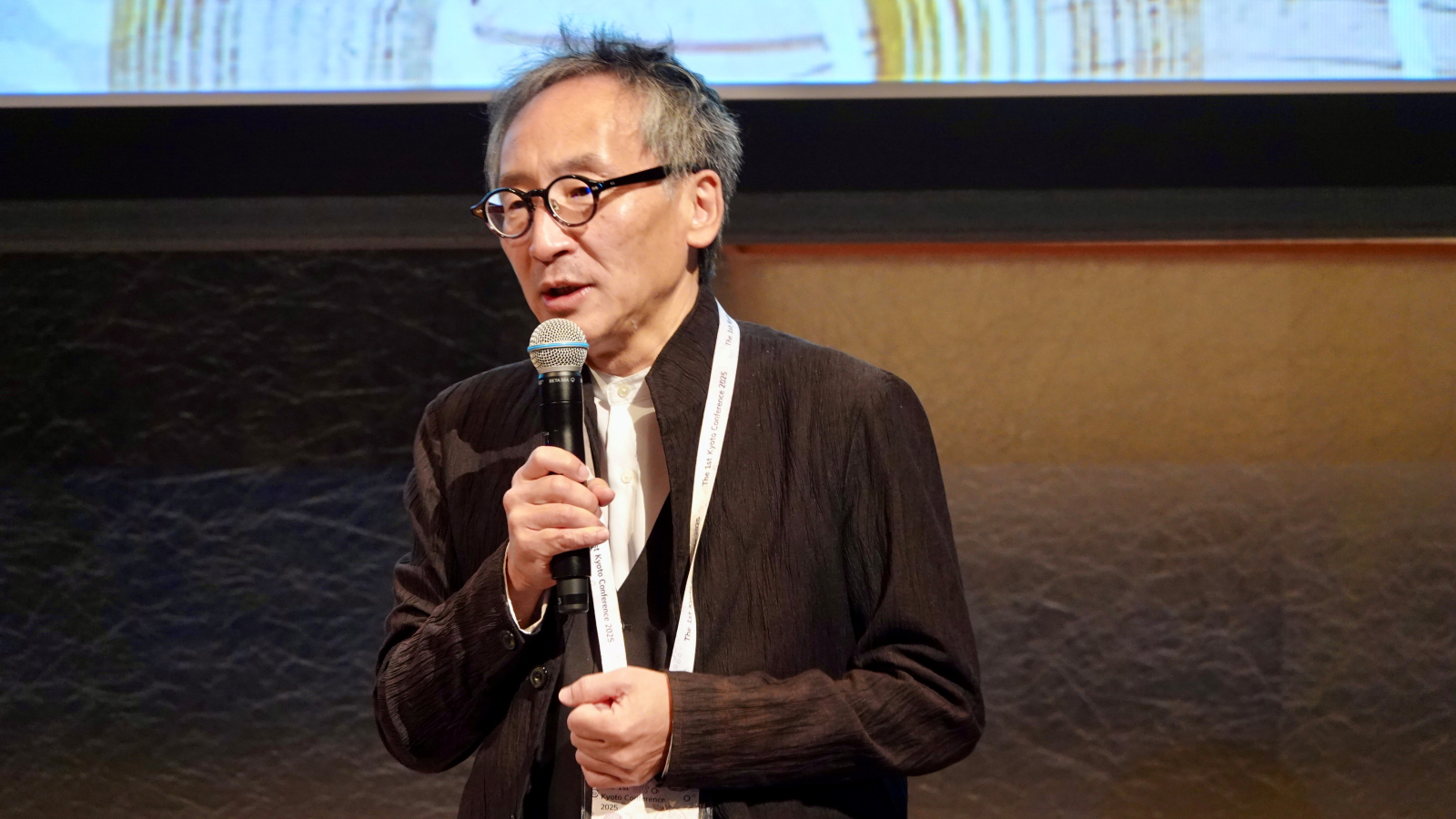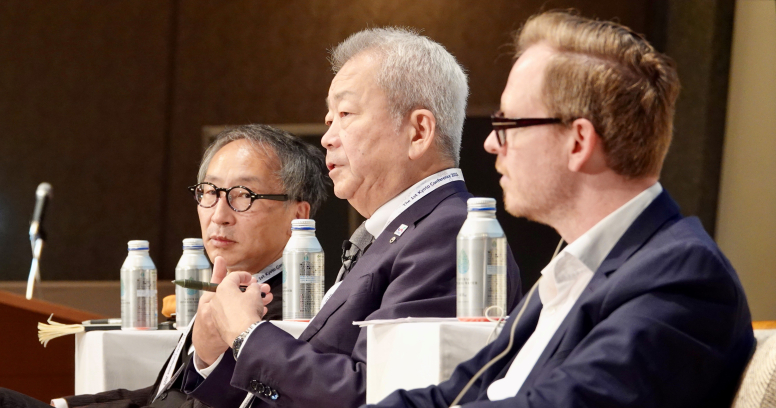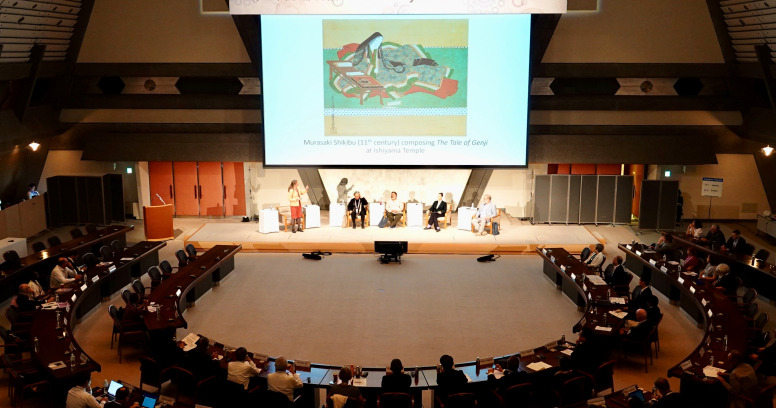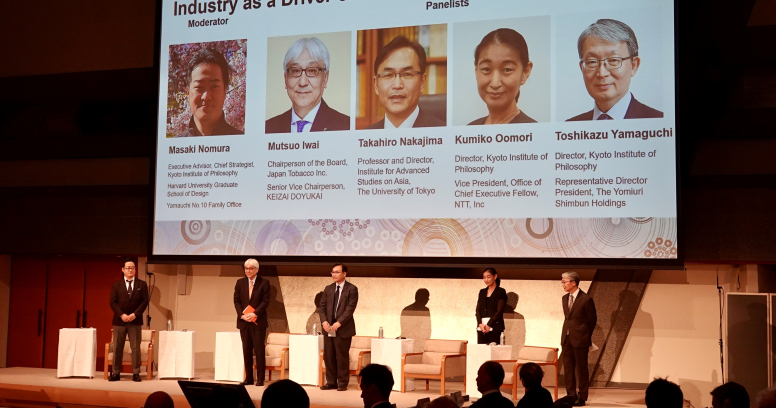Highlights from the Kyoto Conference 2: Dive deep and surface again: Rethinking through the WE-turn: Keynote lecture by Prof. Deguchi: Part 2

In his keynote lecture, which formed the philosophical foundation of the Kyoto Conference, Professor Yasuo Deguchi emphasized two key concepts: “diving” and “surfacing.” What did he mean by this? The second half of his lecture follows here.
Details
“We must return to fundamentals and dive back into so-called naive questions: What is value? What is humanity? What is society? How should the world be? Then, we surface again to bring these reflections into social practice. We go round and round in a continuous cycle, a circular movement. There is no other way forward.”
Speaking with renewed intensity midway through his keynote, Professor Deguchi elaborated on these two movements: diving and surfacing. These were also key ideas presented in the concept note distributed to participants by the Kyoto Institute of Philosophy (KIP). They are grounded in what KIP calls the ABC Model, a framework that reinterprets the mechanisms driving today’s challenges through two forces—fragmentation and transformation—and offers a way of thinking to overcome them. In this model, “A” stands for Action, referring to concrete practices; “C” stands for Core, representing underlying values; and “B” stands for Bridge, which links the two through institutions and cultural forms.
In his lecture, Professor Deguchi proposed that a continual back-and-forth movement—diving from A to C to probe the root causes of problems and surfacing from C to A to envision and realize new values—should be practiced jointly by industry and academia. He also reflected on the role philosophers ought to play in leading this process:
“A major mission of philosophy and the humanities is to propose concrete values to society, building on knowledge gained from science. To propose values once again—this is the kind of endeavor through which we must re-engage with society. I believe that such engagement is what is being called for today.”
One such “value” Professor Deguchi proposes is the concept of the WE-turn. The WE-turn begins with recognizing our fundamental incapability as individuals—the fact that the “I” alone can achieve nothing—and re-turning our perspective to the “WE,” acknowledging that we are always part of a larger collective. Why, he asked, is such a way of thinking necessary in our present age? To explain, Professor Deguchi drew a comparison among three Western philosophers.
“In ancient Greece, Aristotle argued it was rational for those who are intellectually capable to unilaterally rule and dominate those who are not, and conversely, that it benefits both sides for the intellectually incapable to serve the capable. He called those at the top of this hierarchy the ‘masters,’ and those at the bottom the ‘slaves.’”
“It was Immanuel Kant, an Enlightenment philosopher of the 18th century, who said, ‘Nonsense!’ According to Kant, all human beings are born intellectually equal. He opposed slavery and argued that democracy is the best political system for beings who are intellectually equal. However, Kant also maintained that there exists a clear intellectual difference between humans and non-human animals, and that it is only natural for humans to rule over animals while animals unilaterally serve humans.”
“It was Nietzsche who said to Kant’s idea, ‘You must be joking.’ He restated, as Aristotle had said, that there exists a difference in capability—between those who can and those who cannot. Nietzsche makes an interesting point here. On the one hand, he despised the petty zero-sum game that humans play over the master’s seat, and instead proposed a new set of values: that one should strive to become an Übermensch—a superhuman endowed with the power to affirm reality as it is, no matter how miserable that reality may be.”
At this point, Professor Deguchi shifted the audience’s attention back to the modern world, to the age of AI. His voice grew more forceful.
“Nietzschean thought continues to be advocated by various people today. For instance, Curtis Yarvin, often described as part of the tech right, and philosopher Nick Land promote what they call the Dark Enlightenment. They argue that there exist intellectually superior elites and an ordinary public that is inferior, and that an oligarchic system—where only the elites possess direct political rights—is the most appropriate form of governance. Furthermore, turning to one of the major themes of this conference, AI, artificial intelligence, and robots are still unable to design themselves. By maintaining this boundary, they claim, humans remain the masters while AI and robots are the slaves. This so-called ‘Master–Slave Model’—to use Aristotle’s very words—continues to be invoked today as the proper relationship between humans and machines. In contrast, my idea of the WE-turn goes in the opposite direction from Aristotle’s view: it claims that human dignity and irreplaceability lie precisely in our incapability—in what we cannot do.”
Professor Deguchi went on to explain the philosophical background of the WE-turn, noting its connection to the tradition of the “holy fool” in East Asia. “This idea can be seen in the 20th-century Japanese poet Kenji Miyazawa, who wrote that he wanted to become a ‘Deku-no-bō’ (a blockhead), a wooden puppet symbolizing incapability and uselessness.”
He then pointed out that there are both good WEs and bad WEs:
“A typical example of a bad WE is a totalitarian WE—xenophobic toward the outside and oppressive toward the inside. Another typical form of such an oppressive WE is that of a dictator or a privileged social group. In such cases, all other members are pushed to the margins, and a one-sided relationship of domination and subordination, rule and being ruled, service and being served, is established between the center and the periphery. A center-occupied WE is a quintessential example of a bad WE.”
So what, then, is a good WE? Professor Deguchi answered quietly:
“It is a Chūkū (empty-centered) WE, in which the center is intentionally left unoccupied. The WE-turn, in this sense, proposes a more equal Co-adventurer Model—or Fellowship Model—in which individuals participate together in the shared adventure of somatic action.”
As he spoke, moving across the stage, Professor Deguchi suddenly paused.
“That said, the WE-turn is only one among the many layers of values. Gathered here today are people from around the world who embody a wide range of values. Over the course of this day-and-a-half conference, I hope we can take even a small step toward realizing a multilayered society of values—a movement of cyclical exploration and renewal. With that hope, I will conclude my keynote lecture.”
Others



